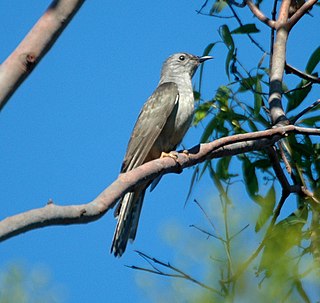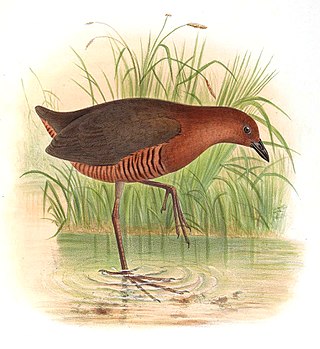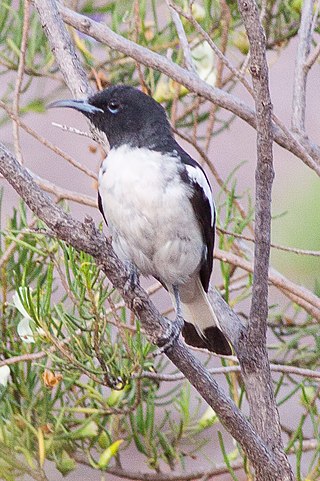
The regent honeyeater is a critically endangered bird endemic to southeastern Australia. It is commonly considered a flagship species within its range, with the efforts going into its conservation having positive effects on many other species that share its habitat. Recent genetic research suggests it is closely related to the wattlebirds.

Edward Pierson Ramsay FRSEFLS LLD was an Australian zoologist who specialised in ornithology.

The bran-colored flycatcher is a small passerine bird in the tyrant flycatcher family. It breeds from Costa Rica through South America to Bolivia, Uruguay, and Argentina. It also occurs on Trinidad.

The white-cheeked honeyeater inhabits the east coast and the south-west corner of Australia. It has a large white patch on its cheek, brown eyes, and a yellow panel on its wing.

The brush cuckoo is a member of the cuckoo family.

The striped honeyeater is a passerine bird of the honeyeater family, Meliphagidae, found in Australia. It is a medium-sized honeyeater, about 23 cm (9.1 in) in length. Both sexes are a light greyish brown with dark brown centres to the feathers, which give the appearance of stripes. The stripes are particularly distinct on the head and back of the neck. While it is found mainly in inland eastern Australia where it inhabits the drier open forest, it is also found in coastal swamp forest from southeast Queensland to the central coast of New South Wales.

The spiny-cheeked honeyeater is the only species in the genus Acanthagenys. It is large for a honeyeater, ranging from 22 to 27 centimeters tall and weighing around 52 grams. The birds are sociable, aggressive, and often observed foraging in large flocks.

The pallid cuckoo is a species of cuckoo in the family Cuculidae. It is found in Australia, with some migration to the islands of Timor and Papua New Guinea. It is between 28 and 33 cm in size, with distinctive markings such as a dark bill, a dark eye with a gold eye-ring and olive grey feet which differentiate it from other cuckoos. The pallid cuckoo is similar in appearance to the oriental cuckoo, with barred immature pallid cuckoos being often mistaken for oriental cuckoos.

The black-banded crake is a species of bird in subfamily Rallinae of family Rallidae, the rails, gallinules, and coots. It is found in Brazil, Colombia, Ecuador, and Peru.

The banded honeyeater is a species of honeyeater in the family Meliphagidae with a characteristic narrow black band across its white underparts. It is endemic to tropical northern Australia.

The pied honeyeater is a species of bird in the family of honeyeaters Meliphagidae and the sole species in the genus Certhionyx. This species is also known as the black and white honeyeater or western pied honeyeater.

The grey-headed honeyeater is a species of bird in the family Meliphagidae. It is endemic to Australia.

The silver-eared honeyeater is a species of bird in the family Meliphagidae. It is found in New Guinea. Its natural habitat is subtropical or tropical mangrove forests.

The scaly-breasted honeyeater, also known as the white-tufted honeyeater, is a species of bird in the family Meliphagidae. It is endemic to Indonesia, where it occurs in the southern Moluccas. Its natural habitats are subtropical or tropical dry forests, subtropical or tropical moist lowland forests, and subtropical or tropical mangrove forests.

The streak-breasted honeyeater or streaky-breasted honeyeater is a species of bird in the family Meliphagidae. It is found on Timor island. Its natural habitats are subtropical or tropical moist lowland forest, subtropical or tropical mangrove forest, and subtropical or tropical moist montane forest.

The New Caledonian myzomela is a species of bird in the honeyeater family Meliphagidae. The species is sometimes considered to be conspecific with the scarlet myzomela of Australia.

The sulphur-breasted myzomela, also known as the orange-breasted myzomela or orange-breasted honeyeater, is a species of bird in the family Meliphagidae.

The mao or ma'oma'o is a passerine bird belonging to the genus Gymnomyza in the honeyeater family Meliphagidae. It is an endangered species and is endemic to the Samoan Islands.



















